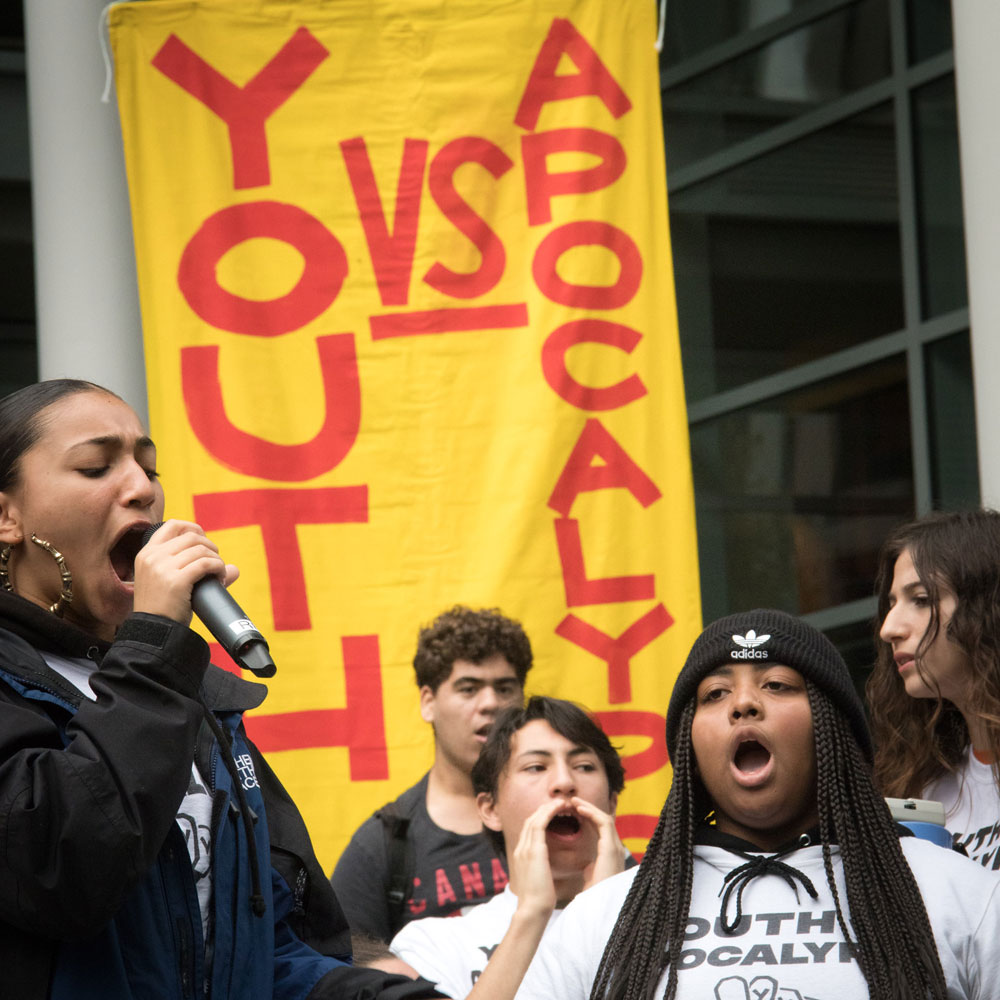
May 12, 2020; Teen Vogue
As we enter June rocked by economic havoc, an ongoing public health crisis, and multi-day, worldwide protests in response to George Floyd’s public execution by police officers, it’s no surprise that calls for systemic change are growing in the US.
Multiple movements are taking place simultaneously, many bolstered by young people’s involvement, including those focused on housing justice; Medicare for All; workers’ rights; mutual aid; and climate, racial, and immigrant justice. While these efforts are not new, they grew in influence during the two presidential runs of Senator Bernie Sanders (I-VT), and have accelerated further due to the pressures of COVID-19.
“I think the pandemic has really taken the mask off capitalism and shown how fragile it is, and how precarious our lives are under a system that puts profit over people, and in a way that has been quite radicalizing for people,” Democratic Socialists of America national political committee member Marianela D’Aprile told Teen Vogue’s Sophie Vaughan.
Young people are having a moment as many experience social, cultural, and political awakenings during this turbulent period. As Samuel J. Abrams and Jeremi Suri opine for CNN:
Young Americans, in particular, are showing commitment to a pragmatic center of policy priorities: affordable health care for all, environmental sustainability, international cooperation, civil rights and economic justice. Despite their current isolation, most young Americans embrace empathetic leadership and they are devoted to serving their communities.
Right now, the conditions are ripe for a youth-led political movement in the United States and other countries, demanding reforms in line with their values. And as societies try to emerge from COVID-19 lockdown conditions, young voices will have an opportunity to grow in influence.
Sign up for our free newsletters
Subscribe to NPQ's newsletters to have our top stories delivered directly to your inbox.
By signing up, you agree to our privacy policy and terms of use, and to receive messages from NPQ and our partners.
Youth-led activism has a long history in the US. Abrams and Suri highlight the civil rights gains and anti-war protests of the 1960s, but younger generations played major roles in 1999’s WTO Ministerial Conference “Battle of Seattle” protests; Occupy Wall Street in 2011; and a multitude of recent movements, including the immigrant rights movement that led to the Deferred Action for Childhood Arrivals (DACA) federal program, Black Lives Matter, and #MeToo. Two specific examples of policy areas that have benefited from youth voices in recent years are climate justice and gun reform.
Regarding climate justice, the Sunrise Movement describes itself as “an army of young people” dedicated to ending climate change while encouraging the creation of green jobs. The popularity of its message is resounding: Sunrise spokesperson Sofie Karasek told Vaughan that their new online course on the Green New Deal drew over 3,500 registrants. They expected 600.
Meanwhile, March For Our Lives has grown nationwide via student-led demonstrations organized by survivors of the 2018 mass shooting at Marjory Stoneman Douglas High School in Parkland, Florida. Seeking to end gun violence in America, powerful voices like that of 20-year-old survivor Emma González have reframed the gun debate and catapulted gun reform to the forefront of political discourse.
A major through-line in the current moment, as D’Aprile notes, is growing disillusionment with capitalism. It didn’t take long for COVID-19 to eviscerate retail, higher education, transportation, or the healthcare system, leaving massive unemployment, furloughing, bankruptcies, and over 100,000 deaths in its wake. The federal government’s $3 trillion response has proven less than ideal.
Collective action and mutual aid networks, in conjunction with the ever-present nonprofit sector, have expanded capacity to fill gaps in need where free market solutions have failed. And, with previously marginalized workers deemed essential by the government, corporations and unjust policies are being increasingly scrutinized and challenged. Sunrise and March For Our Lives frame their platforms as choices between better collective futures and greedy private interests.
With thousands-strong protests erupting around the country, fueled at times by an overwhelming sense of fear and anger, activists both young and old will need the continued support of their communities to prevail. It’s worth remembering that challenging institutions that seem monolithic in nature is an act of vulnerability and selflessness; it is not easy work. But by investing in systems that are equitable—in turn, rejecting systems that prioritize profit and individual wealth over the health, safety, and well-being of our neighbors—we can strengthen a future of equity, access, diversity, and inclusion for everyone. Just as the next generation is doing.—Drew Adams











